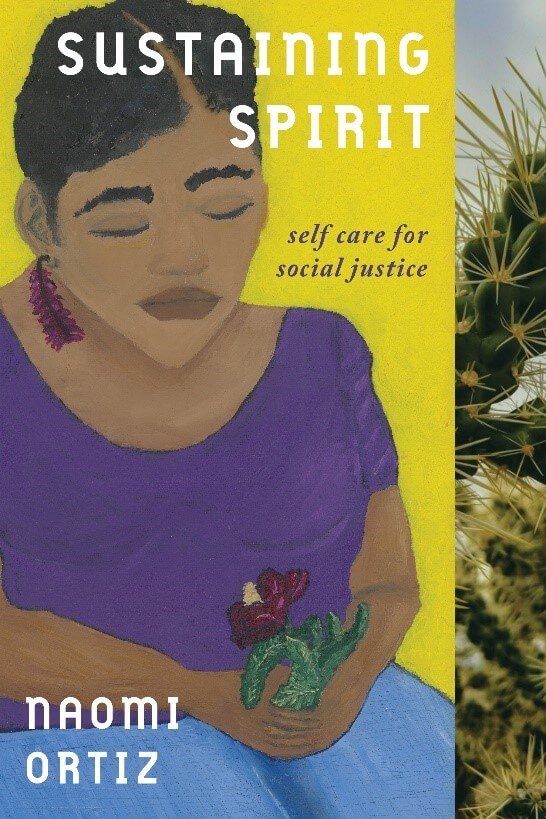
By Natalie Watkins
A few years ago, author and activist Naomi Ortiz found herself wondering why there were so few elders engaged in social justice work. After some digging around, she discovered that many encountered “hard barriers,” and that the model of self-sacrifice for a collective cause was not mentally sustainable longterm. As a result, Ortiz researched self-help strategies — reading a wealth of literature in the field of self-care and self-help. Alas, she discovered that many of the resources she came across were missing one crucial factor. “I found that most self-care advice centered around the body. Tips like taking yoga or drinking a glass of wine in a bubble bath. Those things can be great,” she laughingly concedes, “but, they do not address the mind, spirit and soul.”
This unearthing sent her on a relentless quest to write the kind of tome she wished was out there. And thus, her book, Sustaining Spirit: Self-Care for Social Justice, was born. Ortiz’s title is an extensive and varied collection of interviews with people the author describes as “In the movement.” She skillfully weaves narrative prose with a poetic sensibility. Her book is a unique and highly valuable addition to anyone’s bookshelf who is interested in maintaining a compassionate posture towards themselves and, ultimately, others.
This scribe’s unique and delightful book goes beyond typical self-help strategies to encompass an innovative way to harness one’s essence and deeply honor the self while advocating for a more just and whole world. Her writing is exquisite and her perspective is both poetic and powerful. She has a strong relationship to place, born out of a love for the desert. As Ortiz so beautifully pointed out, “the desert is a place of survival. Plants and animals thrive there in arid conditions.” In keeping with her usual depth and profound perspective, she stated how this works as a metaphor for our lives.
As a writer who identifies as disabled, Ortiz is no stranger to thriving in adverse conditions. Writing has not come easily. “I use Dragon dictation software to write and edit my work. Often words do not come out as intended and editing is required. If I type, it is like pecking.” Naomi wanted to study writing in college but faced many barriers. “The school did not want to have a student studying writing using audio.” She describes the physical act of writing as “laborious.”
This has not deterred her from her resolve to create. She even states that sometimes it is an advantage, encouraging her to “slow down and focus.” Like the plants and animals of her beloved Sonoran Desert, she has flourished in difficult circumstances. This generous and warm author is very open and encouraging when it comes to advising aspiring authors who also identify as disabled. She says that, “goals without perspective are shallow.” Weaving worlds with words must go beyond word counts and Ortiz has a fresh perspective on how writers with or without disabilities can take their writing career to the next level. One piece of advice includes finding a great writing partner. “This does not need to be a mentor” she states. “Someone who reads your work and you read theirs. Someone who can be blunt with you.” Her writing partner gave her pointed feedback on her first version of her manuscript. “I essentially wrote two books,” she says. My writing partner stated that my poetry that I wrote in my journal needed to be integrated into my work, which my previous version sounded like something one would write in school.”
Ortiz is also reassuring about the digital writer platform. So many times we are told that the only way to sell books is to have an expansive author platform fueled by social media posts. She highlights that this really works for some writers. If you happen to love social media, this can be a great career builder. But, do not be discouraged if you do not. Ortiz’s books have sold as a result of a different model. Her readership has grown predominantly through facilitating workshops. She embraced online book talks before the pandemic and continues to do so. In addition, she has presented at conferences and held readings at independent bookstores.
Her final piece of advice for the aspiring writer is to “find a safe place where you feel loved, seen and heard. For me,” she says, “that is in nature with the plants and animals.”
Whether nature fills your soul, like Ortiz, or you are more at home in cityscapes, you will be moved by reading Sustaining Spirit: Self-Care for Social Justice. Even if you do not consider yourself an activist, just living as one who identifies as disabled in our culture necessitates using one’s voice to assert needs. All of us can benefit from Ortiz’s advice, compassion and composure.
For more information about Naomi Ortiz please visit www.NaomiOrtiz.com.
